>>Africa Business Pages > Africa's Economic Woes
How Africa Can Overcome Its Problems
A history of slavery, expliotation, systematic plunder and corruption plagues Africa says Lord Aikins Adusei
Centuries of slavery and 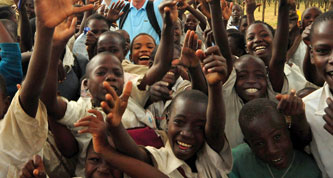 colonialism deprived the African continent of her able human and economic resources. The able men and women were carried away to work in the plantations of the Americas (in all about 30 - 40 million people) and they helped to make America and Europe what they are today. Obviously, the slave trade deprived the continent of her energetic men and women a vital resource in any development process and sunk the continent into intellectual wilderness.
colonialism deprived the African continent of her able human and economic resources. The able men and women were carried away to work in the plantations of the Americas (in all about 30 - 40 million people) and they helped to make America and Europe what they are today. Obviously, the slave trade deprived the continent of her energetic men and women a vital resource in any development process and sunk the continent into intellectual wilderness.
About the same time that slavery was being vigorously pursued, the natural resources including timber, gold, diamond, tin ore, ivory and many more were looted in large quantities by the European countries namely Belgium, Britain, France, Germany, Portugal, Spain and Italy. After slavery was abolished the looting of the natural resources continued.
The irony is that virtually all the income from these resources was used to finance the economic and the infrastructural development of the European countries with little or nothing at all being used to develop the various countries where these resources came from. A clear example is the case of Democratic Republic of Congo where King Leopold II of Belgium enslaved the Africans, forced them to work without pay, killed about 10 million and looted the country of her resources and virtually nothing was used to invest in the country except guns which the Belgium army used to terrorise and kill the Africans.
When the DRC was transferred from Leopold II to the Belgium state the looting and killing continued till DRC gained her independence in the 1960s. In fact DRC (Congo Free State) was the main supplier of rubber a vital raw material for the tyre industry and all the money from the sale of the rubber went to Belgium. King Leopold II was able to transform Belgium as one of the poorest countries in Europe into one of the wealthiest courtesy the enslavement and looting of Africans and their resources.
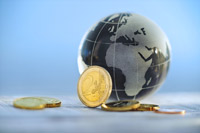 Belgium was not alone in what she did to the continent. Britain, France, Spain, Portugal, Germany and Italy all looted Africa of her gold, diamond, ivory, timber, cobalt, coltan, tin ore, bauxite, manganese and all the minerals you can think of. The Africans who resisted the illegal activities were killed in their millions as happened in South West Africa (now Namibia) where the Germans in 1904 to 1907 committed the first genocide of the 20th century by killing the Herero and the Namaqua people. While Europe became richer Africa became poorer and the trend continued till the 1950s when the African countries started to gain their ‘independence’ beginning with Libya in 1951, Sudan, Morocco, Tunisia all in 1956 and Ghana in 1957.
Belgium was not alone in what she did to the continent. Britain, France, Spain, Portugal, Germany and Italy all looted Africa of her gold, diamond, ivory, timber, cobalt, coltan, tin ore, bauxite, manganese and all the minerals you can think of. The Africans who resisted the illegal activities were killed in their millions as happened in South West Africa (now Namibia) where the Germans in 1904 to 1907 committed the first genocide of the 20th century by killing the Herero and the Namaqua people. While Europe became richer Africa became poorer and the trend continued till the 1950s when the African countries started to gain their ‘independence’ beginning with Libya in 1951, Sudan, Morocco, Tunisia all in 1956 and Ghana in 1957.
With little or no investment in the continent the various post-colonial governments inherited countries with practically no infrastructure: roads, rails, harbours, telecommunications, education, health and sanitation and airports. The only areas which saw some few infrastructure investments during the colonial days were those where raw materials were heavily extracted. The attainment of independence did not come on silver a platter. Algeria, Zimbabwe, Angola, Kenya, Namibia and to some extent South Africa all attained their independence from their colonial masters through armed struggles and in most cases the few infrastructures that existed were destroyed due to the conflicts.
As if slavery, colonialism and the looting of the continent’s resources were not enough the continent became a battle ground during the Cold War as the two super powers and their allies battled for influence and control on the continent mainly for her resources.
The product of all these were the political instabilities and the wanting destruction of lives and property that have bedevilled Africa till today. As the elected leaders of the continent were assassinated, overthrown and subjected to all forms of cold war tactics including bribery, arm twisting and blackmail the continent degenerated and faulted on all aspects of human endeavour.
The new crop of leaders 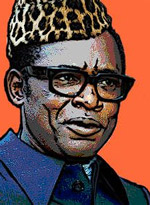 who replaced the post colonial independence leaders and who were largely puppets of the European and American governments, became increasingly authoritarian and corrupt. Joseph Mobutu Sese Seko who became the choice of the Americans after they help to assassinate Lumumba ruled Congo for 32 years and in those years the country became poorer as Mobutu and his cronies got richer and the western countries notably USA and her allies had a free hand looting the mineral resources most importantly cobalt a very important mineral needed for missile development.
who replaced the post colonial independence leaders and who were largely puppets of the European and American governments, became increasingly authoritarian and corrupt. Joseph Mobutu Sese Seko who became the choice of the Americans after they help to assassinate Lumumba ruled Congo for 32 years and in those years the country became poorer as Mobutu and his cronies got richer and the western countries notably USA and her allies had a free hand looting the mineral resources most importantly cobalt a very important mineral needed for missile development.
Little development activities was carried out by Mobutu. As a result Congo today can only be accessed by boats and canoes mainly through the River Congo.
As tyrants and dictators gained the support of western governments and did whatever they wanted with their economies without questions their people became poorer and hopelessness and desperation were the hallmarks of their lives. The little money that came into government coffers were taken by corrupt government officials and civil servants and there were almost no money to carry out infrastructural development and the poverty deepened.
The presence of companies such as Shell, Mobil, Chevron, BP, Total, Rio Tinto, Texaco, BHP Billiton, Anglo-American and others have contributed to the high poverty levels on the continent.
These companies who are mostly resource extraction in nature have destroyed the once rich soils of Africa, forcing many farmers to abandon their farms and loosing their livelihoods. Rivers, wells and streams used by the people for their everyday activities such as washing and drinking have been polluted by these profit making companies. Fishing in most mining and oil drilling communities has ceased as pollution has killed fish stocks in these rivers and lagoons rendering the fishermen unemployed. Communities which were once beaming with life are now ghost communities as land, rivers, lagoons and wells have been destroyed. Respiration, nausea and other mining related diseases are on the increase in many communities where mining and oil drilling are taking place but these profit making companies have abandon their corporate social responsibilities which they owe to the people. In 2006 a Dutch company called Trafigura dumped highly toxic waste in Abidjan, Ivory Coast killing 17 people and sickening thousands. Such inhumane acts by Trafigura is just a tip of the iceberg.
Brain Drain
The poverty on the continent has also come about as result of serious brain drain that has hit the continent in recent times. The flight of doctors, engineers, architects, lawyers, judges, bankers, accountants, teachers, nurses, planners, agricultural experts and others have limited our ability to implement development projects and programmes.
The flight of these intellectuals has rendered many government agencies very weak. In some communities there are hospitals without doctors and nurses. In others there are universities and colleges without lecturers and teachers. Countries like Malawi, Zimbabwe, Nigeria, Ghana, and Liberia have lost so much of their professionals to the very rich countries of Europe and America so much so that many of their sectors have resorted to hiring foreign expertise in order to cope.
For example there are more Malawi doctors in Manchester city alone than the whole of Malawi combined. The irony is that governments use scarce resources to train these intellectuals only for them to leave the country for greener pastures abroad. Britain and the US are major recipient of this brain drain.
Corruption and Mismanagement
Corruption is another cancer that has tragically made the continent very poor. From South Africa to Egypt there is no country where corruption is not endemic. According to the Africa Union (AU) around $148 billion are stolen from the continent by its leaders and civil servants. The Forbes list of most corrupt nations had 9 out of the first 16 countries coming from Africa. Since oil was first discovered in Nigeria about 50 years ago, several billions of dollars have been realised from its but today the whole population continues to live in abject poverty and the country has nothing to show for it. As a result, able men and women are battling dangerous seas just to enter Europe and try their luck. Others have resulted to 419 – a popular scam used to trick people into given out their money and valuables. Those who seem to have benefited from the oil are corrupt politicians, civil servants and the big oil corporations such as Shell, Mobil, BP and their American counterparts.
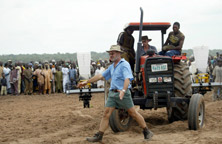 In fact, Nigeria has consistently featured in the top of the most corrupt nations on the planet. Between 2005 and 2007 several state governors and their immediate families were arrested by Scotland Yard in London on corruption and money laundering charges. Among them are James Ibori of oil rich Delta State and his wife Theresa who had their $35 million assets frozen by the English court. Mr. Ibori earns about a thousand dollars a month but during his eight years as a state governor he managed to acquire wealth to the tune of $35m and was a key financial contributor to the campaign of the current president of Nigeria. He owns a private jet and lavish London home.
In fact, Nigeria has consistently featured in the top of the most corrupt nations on the planet. Between 2005 and 2007 several state governors and their immediate families were arrested by Scotland Yard in London on corruption and money laundering charges. Among them are James Ibori of oil rich Delta State and his wife Theresa who had their $35 million assets frozen by the English court. Mr. Ibori earns about a thousand dollars a month but during his eight years as a state governor he managed to acquire wealth to the tune of $35m and was a key financial contributor to the campaign of the current president of Nigeria. He owns a private jet and lavish London home.
Another corrupt governor is Diepreye Alamieyeseigha, governor of oil-rich state of Bayelsa who was also arrested in London for money laundering charges. Mr. Alamieyeseigha broke his bail conditions and evaded capture in Britain by dressing up as a woman.
When Police conducted a search in his London home they discovered one million pounds worth of cash in his home.
Another governor who was arrested in England was Joshua Dariye of Plateau State. He was arrested in a London hotel for stealing money meant for development of his state.
In South Africa, Jacob Zuma is still battling it out with the court for his part in the multi-billion arms deal. He was forced to resign as Deputy President of South Africa.
The late Mobutu in his 32 years as President of Zaire, (now DR Congo) amassed several billions of dollars belonging to the Congo people.
In 2006 former president of Malawi, Bakili Muluzi was arrested for pocketing $12 million donated to his poor country by foreign governments. Former Zambian president Frederick Chiluba was arrested together with two businessmen Aaron Chungu and Faustin Kabwe and charged with 11 counts of stealing money meant for the Zambia’s development.
In Equatorial Guinea, where oil export has earned the country billions of dollars, the 600,000 people living in the country continue to live in poverty while Teodoro Obiang Nguema and his cronies continue to siphon the oil revenue with no accountability. Gabon and Angola, both oil exporting countries, are no different. In fact, the governments in Gabon and Equatorial Guinea can best be described as Kleptocracy – that is government by thieves.
In countries such as Nigeria, Egypt, Cameroon, The Gambia, Sudan, Uganda, Libya, Tunisia a Kleptocracy class of people have replaced anything related to democracy.
In these countries very few people continue to remain in power and the people have no say in the way their country is govern or run. For example Gaddafi of Libya has been in power for 39 years now. Omar Bongo of Gabon 31 years, Teodoro Obiang Nguema of Equatorial Guinea 28 years, Robert Mugabe of Zimbabwe 28 years, Hosni Mubarak of Egypt 27 years, Paul Biya of Cameroon 26 years, Yoweri Museveni of Uganda 22 years, Omar Al Bashir of Sudan 19 years, Iddriss Derby of Chad 17 years, Yahya Jammeh of Gambia 14 years – and the list is unending.
What is clear is that these unelected leaders continue to amass wealth at the 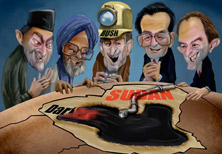 expense of their poor countries and continue to mismanage whatever remains of their corrupt acts. Because most of the leaders are former military officers or former rebels with no grasp of economics and management, they are unable to formulate any good economic policies that will make their economies grow hence poverty has become a part of the people but their leaders know not what poverty is.
expense of their poor countries and continue to mismanage whatever remains of their corrupt acts. Because most of the leaders are former military officers or former rebels with no grasp of economics and management, they are unable to formulate any good economic policies that will make their economies grow hence poverty has become a part of the people but their leaders know not what poverty is.
A visit to the Niger Delta region of Nigeria shows that majority of the people are unemployed. Years of oil spills have made the soil unfit for any agricultural activity. Their streams and wells are polluted and the people have no access to basic necessities of life even though billions of dollars is realised from the sale of oil from that region every year.
In the 1990s, economic hardship, abject poverty and destruction of the environment forced the people of Ogoniland to demand a say in which Shell operates but the military regime led by Gen. Sani Abacha arrested the environmentalists led by Ken Sorowiwa and executed them.
In DR Congo it is estimated that gold and diamond deposits alone could fetch the country $23 trillion not to mention the abundance of timber and other several minerals that are found in large quantities such as columbo-tantalite (coltan) and cassiterite (tin ore) yet years of corruption, mismanagement, conflicts and foreign involvement have made this resource rich nation one of the poorest in the world.
Coltan, for example, is used in every mobile phone and a number of electronic devices. Cassiterite used in electronic circuit boards is the most traded metal on the London Stock Exchange. It is often said that western nations cannot maintain their current level of lifestyle without Congo and most corporations in the west can easily go bust without Congo.
The question is, if Congo is the blood line of the west and the west is rich because of Congo, then why is Congo so poor? And where are the billions of dollars from the sale of these minerals?
The answer lies in the history of the nation which is corruption, slavery, colonialism, assassinations, armed conflicts and foreign involvements. Since her independence from Belgium in 1960 there has not been peace in the country.
Several millions of Congolese have died – about four million of them in the last eight years alone – and most of the dead are civilians. The conflict in Congo is largely about who controls the vast resources in the country. The huge size of the country has made its administration very difficult.
The problem is further exacerbated by weak, ill-trained, undisciplined and very corrupt Congolese army who abduct, terrorise, rape and murder the people instead of protecting them.
Everyday in Walikale about 16 aircraft fly out of the city with loads of minerals bound for Rwanda. These stolen minerals further find their way in the western mineral market in London and Switzerland. The proceeds are shared by the warlords in Congo, the Generals, politicians and the businessmen in Rwanda and the rest is used to acquire weapons that are used to terrorise the people and prolong the war.
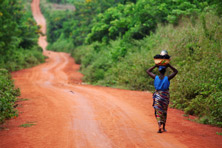 THE WAY OUT
THE WAY OUT
It is clear that several forces within and outside the continent have contributed to making the continent the poorest on earth. But there is no time to look back but a time to look forward and get our acts together, organise ourselves and start doing something.
The progress that has been made by China, India, Korea, Taiwan, Singapore, Malaysia the Gulf countries including Bahrain, Kuwait, United Arab Emirates Saudi Arabia and Qatar over the last 30 to 50 years shows that poverty has got nothing to do with colour or race. Nations become poor because their leaders fail to formulate policies and programmes that address their problems.
To reverse the negative impact of centuries of slavery and colonialism on one hand and decades of coups, civil wars, corruption, mismanagement and foreign interventions on the other hand, the governments should focus their attention on reforming their democratic institutions and allow free and fair elections to be organised. They should do more to fight corruption and mismanagement, establish independent corruption watchdogs, strengthen the judiciary, and be accountable to the people.
They should curtail the power of the army and embark on concrete, sound and result driven policies to discourage brain drain.
The governments should embark on building social and economic infrastructures - schools, hospitals, roads, rail lines, telecommunications, airports, harbours, markets, that will lay the foundation for economic and social development. They should establish research institutions to find out how best to use the various natural resources to benefit the people.
As the saying goes “resources are not but they become” – you may have all the natural resources in the world but if you do not have the ability to convert them into useful commodities/ consumables to benefit the people they are nothing.
The AU should be more concerned about fighting poverty than just been a talking shop for corrupt, kleptocrats and dictators.




Exportateurs à Dubaï Fournir à l'Afrique